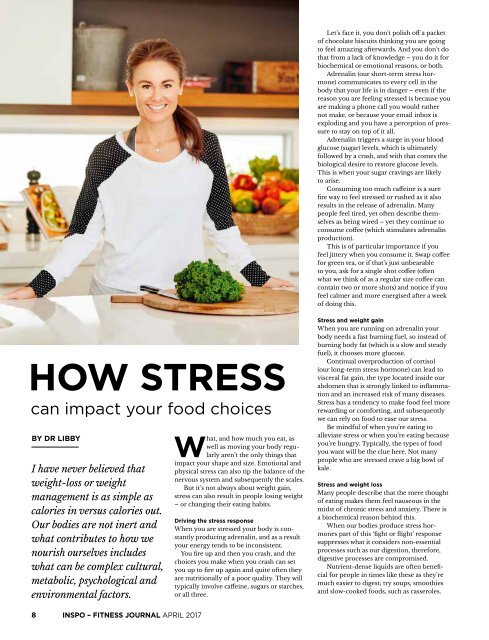INSPO Fitness Journal April 2017
Everything from nutrition, beauty, home and workplace wellbeing to health, performance – and so much more.
Everything from nutrition, beauty, home and workplace wellbeing to health, performance – and so much more.
Create successful ePaper yourself
Turn your PDF publications into a flip-book with our unique Google optimized e-Paper software.
Let’s face it, you don’t polish off a packet<br />
of chocolate biscuits thinking you are going<br />
to feel amazing afterwards. And you don’t do<br />
that from a lack of knowledge – you do it for<br />
biochemical or emotional reasons, or both.<br />
Adrenalin (our short-term stress hormone)<br />
communicates to every cell in the<br />
body that your life is in danger – even if the<br />
reason you are feeling stressed is because you<br />
are making a phone call you would rather<br />
not make, or because your email inbox is<br />
exploding and you have a perception of pressure<br />
to stay on top of it all.<br />
Adrenalin triggers a surge in your blood<br />
glucose (sugar) levels, which is ultimately<br />
followed by a crash, and with that comes the<br />
biological desire to restore glucose levels.<br />
This is when your sugar cravings are likely<br />
to arise.<br />
Consuming too much caffeine is a sure<br />
fire way to feel stressed or rushed as it also<br />
results in the release of adrenalin. Many<br />
people feel tired, yet often describe themselves<br />
as being wired – yet they continue to<br />
consume coffee (which stimulates adrenalin<br />
production).<br />
This is of particular importance if you<br />
feel jittery when you consume it. Swap coffee<br />
for green tea, or if that’s just unbearable<br />
to you, ask for a single shot coffee (often<br />
what we think of as a regular size coffee can<br />
contain two or more shots) and notice if you<br />
feel calmer and more energised after a week<br />
of doing this.<br />
HOW STRESS<br />
can impact your food choices<br />
BY DR LIBBY<br />
I have never believed that<br />
weight-loss or weight<br />
management is as simple as<br />
calories in versus calories out.<br />
Our bodies are not inert and<br />
what contributes to how we<br />
nourish ourselves includes<br />
what can be complex cultural,<br />
metabolic, psychological and<br />
environmental factors.<br />
What, and how much you eat, as<br />
well as moving your body regularly<br />
aren’t the only things that<br />
impact your shape and size. Emotional and<br />
physical stress can also tip the balance of the<br />
nervous system and subsequently the scales.<br />
But it’s not always about weight gain,<br />
stress can also result in people losing weight<br />
– or changing their eating habits.<br />
Driving the stress response<br />
When you are stressed your body is constantly<br />
producing adrenalin, and as a result<br />
your energy tends to be inconsistent.<br />
You fire up and then you crash, and the<br />
choices you make when you crash can set<br />
you up to fire up again and quite often they<br />
are nutritionally of a poor quality. They will<br />
typically involve caffeine, sugars or starches,<br />
or all three.<br />
Stress and weight gain<br />
When you are running on adrenalin your<br />
body needs a fast burning fuel, so instead of<br />
burning body fat (which is a slow and steady<br />
fuel), it chooses more glucose.<br />
Continual overproduction of cortisol<br />
(our long-term stress hormone) can lead to<br />
visceral fat gain, the type located inside our<br />
abdomen that is strongly linked to inflammation<br />
and an increased risk of many diseases.<br />
Stress has a tendency to make food feel more<br />
rewarding or comforting, and subsequently<br />
we can rely on food to ease our stress.<br />
Be mindful of when you’re eating to<br />
alleviate stress or when you’re eating because<br />
you’re hungry. Typically, the types of food<br />
you want will be the clue here. Not many<br />
people who are stressed crave a big bowl of<br />
kale.<br />
Stress and weight loss<br />
Many people describe that the mere thought<br />
of eating makes them feel nauseous in the<br />
midst of chronic stress and anxiety. There is<br />
a biochemical reason behind this.<br />
When our bodies produce stress hormones<br />
part of this ‘fight or flight’ response<br />
suppresses what it considers non-essential<br />
processes such as our digestion, therefore,<br />
digestive processes are compromised.<br />
Nutrient-dense liquids are often beneficial<br />
for people in times like these as they’re<br />
much easier to digest; try soups, smoothies<br />
and slow-cooked foods, such as casseroles.<br />
8 <strong>INSPO</strong> – FITNESS JOURNAL APRIL <strong>2017</strong>


















